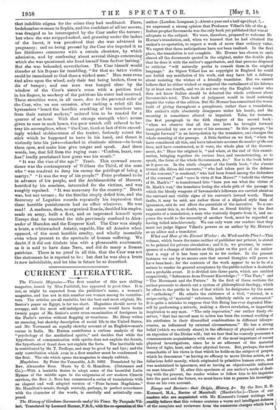author. (London: Longman.)—About a year and a half ago (Sept.
7, we expressed a strong opinion that Professor Tillewi's life of the g. Italian prophet Savonarola was the only book yet published that was at adequate to the subject. We were, therefore, prepared to welcome MI
Horner's translation, and, when we learned that he had obtained the author's co-operation, to expect a work of more than ordinary value.
We regret that those anticipations have not been realized. In the first place, the translation is not complete. Mr. Homer has chosen to omit almost all the documents quoted in the original, under the double plea
that he does it with the author's approbation, and that persons disposed to criticize "will naturally prefer to consult them in the original language." As Signor Villari has no copyright in England he could not forbid any mutilation of his work, and may have felt a delicacy about resisting the wishes of a friendly translator. But we cannot believe that he either wished or suggested the curtailment of his labours by at least one-fourth, and we do not see why the English reader who does not know Italian should be debarred the whole evidence about Savonarola's trial. This fault of judgment would in itself seriously impair the value of the edition. But Mr. Homer has committed the worse fault of giving throughout a paraphrase, rather than a translation. His author's style absolutely disappears under his hands, and the meaning is sometimes altered' or impaired. Take, for instance, the first paragraph in the fifth chapter of the second book : "when we observe that all the new laws he brought forward were preceded by one or more of his sermons." In this passage, "he brought forward" is an interpolation by the translator, and changes the whole meaning of the passage. A little further on we find, " when we have considered all this, and have taken into account the number of the new laws, and have constructed, as it were, the whole plan of the Govern- ment, &c." Here the original is, "and when, at the end of this exami- nation, bringing together the various laws, and reconstructing, so to speak, the form of the whole Government, &c." Nor is the book better as it goes on. In the ninth chapter of the fourth book, " the s'erano trovati alla difesa del convento," "who had taken part in the defence of the convent," is rendered," who had been found among the defenders of the convent ;" and " eceo le virtu di San Marco!" " behold the virtues of St. Mark's ! " is transformed into "here you see what the virtue of St. Mark's was," the translator losing the whole pith of the passage in which the bloody weapons of Savonarola's followers are carried about as the outward and visible signs of his convent's inward worth. These faults, it may be said, are rather those of a slipshod style than of ignorance, and do not affect the essentials of the narrative. To a cer- tain extent this is, no doubt, true. But as literal fidelity is the first requisite of a translation, a man who wantonly departs from it, and ex- poses the world to the necessity of another book, must be regarded as having failed mischievously. We can only warn our readers that they must not judge Signor Villari's powers as an author by Mr. Homer's as an editor and a translator.






























 Previous page
Previous page